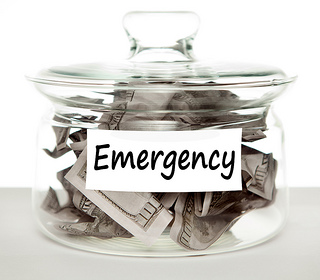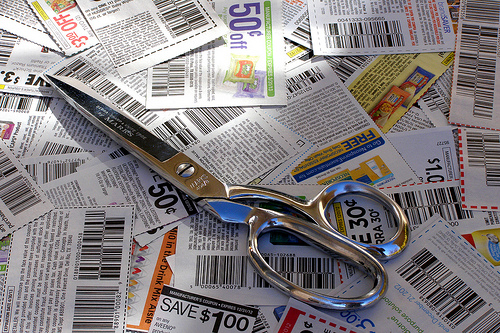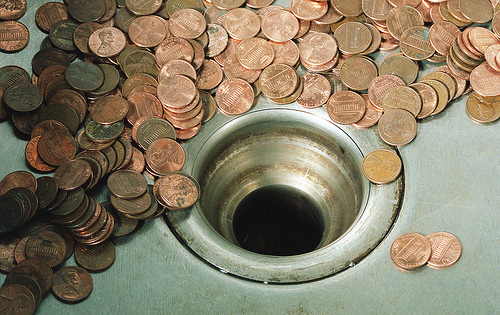Budgeting is the best way to monitor your finances and be sure that you’re not spending more money than you make. If you’re working on paying off debt, or if you’d like to find ways to save more money, a budget will allow you to see exactly where all of your money is going, and how you can change spending habits to meet your current needs.
savings
Why We Have Emergency Savings
What would you do if you found yourself in an unthinkable situation? One of the most important things to save for is an emergency, whatever that may be to you.
100 Ways to Save
In honor of my 100th budgeting blog post, I wanted to share 50 quick tips for saving or making a little extra cash.
What Are You Saving For?
One of the only confusing things about saving money is figuring out what in the world you actually need to save for. How do you know how much money you need and what do you do with it?
What Should I Do With Unallocated Money?
I make a real effort to stick to my budget pretty strictly every month, but I must say, I’ve been absolutely BY THE BOOKS these past few months! I’ve added in even more allocations to help me better direct my spending, and I’ve cut back on unnecessary expenses. By doing this, I was able to completely pay off my small outstanding credit card bill AND put extra money into savings!
Savings Challenge Check-In: The Final Report
If you’ve been following along, you might remember that I started a year-long Savings Challenge last March (you can catch up here, here, and here). The end is in sight, and I wanted to share one final update with you!
Are You Wasting Your Money?
We all try our best to be aware of our spending, but sometimes sneaky little things can slowly start to drain your bank account.
Online Savings
We’re officially all moved in to our first house, and the only problem we’ve encountered so far is controlling my intense desire to shop. I really want to make it feel like home, so there are a few things I’d like to purchase or update. Since I’ve been budgeting for this for quite some time now (thank you, BudgetSimple!), I have a little bit of wiggle room with my spending. We’ve clearly upgraded from our first apartment, and we plan on staying here for a little while, so I want to invest in items that will stand the test of time, both physically and stylistically. I also have a very specific tone in mind when it comes to home decor and design. To make everything appear exactly the way I’m thinking, I’ve started to scour the internet for the perfect pieces. Since I’m on a mission to furnish our new space in a more “grown-up” fashion while not spending a fortune, I’ve come up with a list of tips and tricks for saving more on online purchases. Check them out and keep some of them in mind the next time you’re adding things to your virtual shopping cart!
- Search for coupon codes. I feel like “Bed Bath & Beyond coupon” is permanently printed in my search bar as of late. Whether it’s for a percentage off of your total or free shipping, you can almost always find a code for whatever store you’re shopping at.
- Buy refurbished. We generally take this route for electronics. We’ve done it with computers, tablets, phones, and televisions. Manufacturers offer this option with a guarantee that the previously returned items have met their standards and are suitable for purchase. Good as new, but a fraction of the price!
- Be on the lookout for free shipping. Sometimes retailers will offer free shipping on specific items or within a certain department, or they’ll offer it if you spend a minimum dollar amount. Either way, it might be a good idea to add items to your cart, but wait to purchase them until a free shipping offer comes your way. I’ve even received deals from some stores for doing this as an incentive to purchase the items I’ve been eyeing up.
- Use a subscription service for frequently purchases items. This tends to apply more to household supplies. If you find yourself constantly running to the store for things like detergent, shampoo, etc., then it might be worthwhile to sign up for a subscription service (through places like Amazon.com). You’ll get a great discount for ordering on the regular, and you’ll save yourself time and money by not having to drive to the store quite as often.
- Wait for a sale. I get enough flyers and emails from stores where I’ve made purchases to know that just about anything will go on sale at some point in time. Sometimes, it’s just a matter of patience. Stores will often offer discounts on items right before a season starts (think grills and patio furniture in early spring) or at the end of the season (look for steep discounts on these same items as winter approaches, as stores will begin emptying their shelves to make room for new seasonal products).
- Check for an outlet store. A lot of big-name stores have an outlet version, whether it’s a brick-and-mortar location or a particular section of their website. You can often snag markdowns on last year’s models of furniture or housewares, or discounted scratch-and-dent items for a steal.
- Price matching. This one doesn’t always work, but it’s worth a shot. Some retailers will match competitor pricing, whether you find your numbers at another store or online. It doesn’t hurt to ask if they can do better for you!
Do you prefer shopping online or in-store? What do you do to save the most money?
Money Etiquette
I make it a habit to spend one day per week with my younger sister, which is fondly referred to as “Sister Sunday” now. We usually go out to lunch and then spend the day watching an assortment of bad television. We’re not very particular, but when our budgets are tight for the month, we tend to scrap by with a quick, inexpensive meal together. This past weekend, we were at a local pizza place where they basically brought us our drinks and our meal, and then disappeared. The bill came, which was pretty cheap, but it left my sister wondering how you tip in this situation – do you tip on service, even when it’s minimal, or do you tip based on the cost of the bill?
20 Small Ways to Save Big
We’d all love to save more money, but it can be tricky when you have so many responsibilities to attend to first, like monthly bills and outstanding debt. If you’d like to grow your savings faster, there are a ton of little things you can do or change that can add up to big savings.










